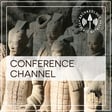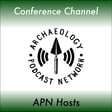Become a Creator today!Start creating today - Share your story with the world!
Start for free
00:00:00
00:00:01

061 - CIFA2018 - Dr. Andy Holland
This is a short interview conducted at the Chartered Institute for Archaeologists conference in Brighton. Dr. Andy Holland is a Post-Doctoral researcher at the University of Bradford, specialising in Forensic Archaeology. We discuss how forensics archaeologists work with law enforcement, and how conferences bring both commercial and academic archaeologists together.
Links
https://www.bradford.ac.uk/life-sciences/arch-sci/our-staff/andy-holland-.php
Recommended
Transcript
Introduction with Andy Holland
00:00:01
Speaker
You're listening to the Archaeology Podcast Network. Hi, this is Tristan here for the Archaeology Podcast Network. I'm sitting here opposite Andrew Holland, here at Brighton. Where?
00:00:19
Speaker
It's Andy. I hate. Nobody calls me Andrew. Right. So I just messed up. Let's see. I'm sitting beside Andy. Dr. Holland. What's it like being named after a country? I'm not.
00:00:35
Speaker
I'm just kidding, right, anyway. They're named after me. Actually, there's some history in that. Really? How do you call Holland? It's an Anglo-Saxon clan with Norman Lynx as well. We're one of those weird families that bridge the channel and we're in both sides. So, with a fifth century Anglo-Saxon clan, so we're not named after the country at all. Nice. It comes from Hoyland, something like that, meets Hollow Land, Low Country.
00:01:05
Speaker
Strange, strange. Anyway, so tell us a little bit about where you've actually spoken before, I think last year.
Andy's Academic Journey
00:01:12
Speaker
Yeah, I think so. But as a refresher, in case anybody hasn't listened last year, so you're part of which university? I'm from the University of Bradford, where I'm doing a postdoc about following my PhD, just researching as part of a larger project called Fragmented Heritage, although I do lots of other things as well as that.
00:01:32
Speaker
Right, so have you presented at the conference or will you be presenting at the conference this year? Not this year, I have presented in the past. However, instead of presenting, I'm on two panels. I'm a forensic archaeologist as well as playing with 3D systems and we have a forensic archaeology special interest group session on Friday morning where we'll have the expert panel, which I'm the secretary of,
00:01:58
Speaker
We'll have a panel session, question and answer session. And then, because I'm chair of Advisory Council for CIFA, I'm part of the Plenary Panel and the Plenary Session right at the end of conference on Friday afternoon.
Forensic Archaeology Explained
00:02:12
Speaker
Awesome. So, forensic archaeology, what's the main difference there?
00:02:19
Speaker
The spiel I give to students, particularly prospective students, I suppose would be applicable here, and that's that archaeology looks at tiny clues as evidence of the past activity. Forensic archaeology works with the police who are interested in tiny clues about recent past activity, usually for a criminal investigation, and so there's a clear synergy there.
00:02:44
Speaker
Over the last 25 years or so, that's built to become a whole discipline in itself where we support criminal investigation, disaster victim identification, mass fatality investigations, all those sorts of things, using archaeological skills.
00:02:59
Speaker
That's actually really cool, and that kind of does tie it to the whole kind of Silent Witness kind of thing. Obviously, Silent Witness is a TV show, but that actually generally sounds really, really interesting. What makes you tick in archaeology?
Passion for the Past
00:03:18
Speaker
What really gets you up in the morning?
00:03:24
Speaker
It's a personal question, yes. Yes. I suppose what I really love about archaeology is the connection to the past. I think when I was an undergraduate, in fact before I was an A-level student and I was still at school, I went off and did some excavations and volunteers.
00:03:44
Speaker
that tangible link, that ability to pick up an object, to excavate it from the ground, even if it was just a piece of brimless potsherd with very little archaeological value, to me it was still amazing as a child that I was picking up an object that hadn't been touched
00:04:01
Speaker
for three, four, five hundred years, maybe even more. And there was a physical link to the people in the past and I could imagine how they behaved and interacted with
Bridging Archaeological Spheres
00:04:13
Speaker
this. And that's what spurred my interest in the past. It grew from that.
00:04:18
Speaker
This conference is really a melding of academic and commercial archaeological enterprises. And I'm just wondering, what do you see as the way to bridge the gap? Because there has always been a kind of a difference between academic and commercial archaeology. From your perspective, what does a conference like this do? Does it bring people together or does it just are the lines still there?
00:04:44
Speaker
I think the lines are still there. I think they always will be to a degree. I think what this conference does is allows a space in which we can talk about how we might bridge those gaps, what the big ideas are, and to think about those big ideas, to talk about the way that we want to see archaeology develop in the future.
00:05:07
Speaker
both at the sort of purely sort of practical level of do we want to become a charter dog and do we want to take our charter and we can have chartered archaeologists you know all those sort of technical details which are really important but also at the sort of where's archaeology going what are the big questions we're trying to answer how do we get people to talk about outside of their small silos of their either their academic research areas or their commercial
00:05:34
Speaker
you know, commercial work areas, and talk to each other. And that's what this conference is doing. So hopefully, I don't know how, hopefully it'll do that. I don't know how we bridge that gap, but that's what the conference we're hoping is doing, is coming up with ways and ideas on how to do that.
Theoretical Insights in Archaeology
00:05:49
Speaker
I've started asking people a very simple question. What do you think of theory, archaeological theory? And just seeing what the answers are, how do you feel about archaeological theory?
00:06:04
Speaker
I think it's incredibly important, the idea that you can carry out something we think of almost as a scientific discipline, such as archaeology, and be able to use archaeological evidence to talk about the past without examining our own preconceptions, the way that we make those decisions, and therefore the application of theory to our interpretation.
00:06:31
Speaker
The idea that we couldn't do that seems nonsensical in any other field, so why would it be acceptable in archaeology? Of course we should be looking at theory. That said, on a day-to-day basis, obviously we're not always
00:06:48
Speaker
desperately thinking about phenomenology or whatever else. But it should be there. It's key to any archaeological area in education, be that undergraduate or apprenticeship or whatever method you go. And I think it's important to our understanding, the way we review our understanding of the past and our own interpretations and biases, et cetera.
Innovative Public Engagement
00:07:10
Speaker
What projects that you're currently working on do you really like to talk about? What do you really want to signpost with the chance? At Bradford, we've got some amazing projects we're working on at the moment. I was part of a project called Digitised Diseases. It's been over a couple of years now, but we're still working on it, which brought 3D digitised versions of pathological skeletons, legal elements, and put them on the web for anybody to view in 3D.
00:07:39
Speaker
We've taken that further with other 3D projects. At the moment I'm working on one called Fragmented Heritage, where we're using 3D systems and 3D digitisation to visualise everything from the microscopic scale right up to the landscape scale. And part of that is a citizen science project called Fossil Finder, which you can go onto the web and anyone can go on and join. It allows anybody to take part. We've got some overhead photography flown by drones in Kenya in the Takana Basin.
00:08:09
Speaker
prior to the ban on drones which they're now changing again thankfully which will allow us to do some more field work and that is resolved down at less than millimetres resolution which is incredible and that means that we chopped it up into small squares you go onto our website and you can identify
00:08:28
Speaker
fossil hominid remains, fossil animal remains, plants, lithics and staring at the ground may not sound all that great but it is really interesting and it's engaging a very large number of our users who are taking this data and they're doing new things with it that we didn't think they would so they're actually starting to drive our research ideas and our research questions for future projects because
00:08:52
Speaker
they're allowing us to think outside the box because they are outside the box and that's fantastic and to the point where some of our volunteers are actually becoming our authors on some of our papers so you know we're engaging with the public not just showing them stuff but actually having them show us stuff as well. That sounds absolutely wonderful. Thank you very much for your time. No problem.
00:09:15
Speaker
This has been a presentation of the Archaeology Podcast Network. Visit us on the web for show notes and other podcasts at www.archpodnet.com. Contact us at chrisatarchaeologypodcastnetwork.com.

